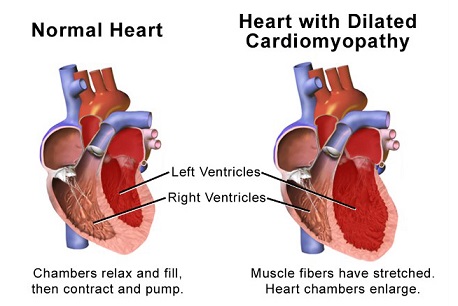Nikhil Prasad Fact checked by:Thailand Medical News Team Jun 21, 2024 10 months, 5 days, 23 hours, 19 minutes ago
Cardiology Updates: Heart disease remains one of the leading causes of death globally, affecting millions of people each year. Among various heart conditions, dilated cardiomyopathy (DCM) is particularly challenging. DCM weakens the heart muscle, causing it to enlarge and struggle with pumping blood efficiently, leading to heart failure and often necessitating a heart transplant. However, recent research covered in this
Cardiology Updates news report has uncovered a promising new approach to treating DCM using histone deacetylase inhibitors (HDACi).
 Treating Dilated Cardiomyopathy Via The Use Of Histone Deacetylase Inhibitors
What Are Histone Deacetylase Inhibitors?
Treating Dilated Cardiomyopathy Via The Use Of Histone Deacetylase Inhibitors
What Are Histone Deacetylase Inhibitors?
Histone deacetylases (HDACs) are enzymes that remove acetyl groups from proteins, which can impact gene expression and protein function. HDAC inhibitors (HDACi) are compounds designed to block the activity of these enzymes. While HDACi are primarily used in cancer treatment due to their ability to regulate cell growth and survival, recent studies suggest they may also offer significant benefits for heart disease patients by enhancing the function of heart cells.
Research Breakthrough
A groundbreaking study conducted by researchers at the State Research Institute Centre for Innovative Medicine in Lithuania explored the potential of HDAC inhibitors to improve the function of heart cells derived from DCM patients. The study focused on mesenchymal stem/stromal cells (MSCs) isolated from both healthy and diseased heart tissues. These cells have the potential to transform into various cell types, including those that make up heart muscle tissue.
Methodology
The researchers used MSCs from both healthy and DCM-affected hearts to compare their characteristics and responses to HDAC inhibitors. The cells were treated with three different HDAC inhibitors: SAHA, mocetinostat, and MC1568. Various parameters were measured, including mitochondrial activity, energy production (ATP levels), and the expression of cardiac-specific proteins and genes.
Key Findings
-Improved Mitochondrial Function: The study found that HDAC inhibitors significantly improved mitochondrial activity in both healthy and diseased MSCs. Mitochondria are known as the powerhouses of the cell, crucial for generating the energy needed for cellular functions. Enhanced mitochondrial function means better energy availability for heart muscle cells.
-Increased Energy Production: ATP levels, which indicate the energy status of cells, were higher in MSCs treated with HDAC inhibitors. ATP is the primary energy currency of the cell, and increased levels suggest a higher energy capacity, essential for supporting the continuous pumping action of the heart.
-Activation of Cardiac Genes: HDAC inhibitors stimulated the expression of important cardiac genes such as NKX2-5, HOPX, and GATA4. These genes are vital for the development and function of hea
rt muscle cells, indicating that HDAC inhibitors may help in transforming MSCs into functional heart cells.
-Enhanced Structural Proteins: The study observed an increase in the levels of structural proteins like cardiac troponin T and alpha cardiac actin. These proteins are integral components of the contractile apparatus in heart muscle cells, contributing to their strength and functionality.
Understanding the Mechanisms
One of the exciting aspects of this research is understanding how HDAC inhibitors work at the molecular level. HDACs play a role in regulating gene expression by modifying the acetylation status of histones, the proteins around which DNA is wrapped. By inhibiting HDACs, these drugs can alter the expression of genes that are crucial for cell function and survival.
In the context of heart cells, HDAC inhibitors appear to enhance mitochondrial function, leading to increased energy production. Mitochondria are essential for heart cells as they provide the energy required for continuous contraction and relaxation. Improved mitochondrial function translates to better energy availability, which is critical for maintaining healthy heart function.
The Role of Reactive Oxygen Species (ROS)
The study also highlighted the role of reactive oxygen species (ROS) in heart cell function. While excessive ROS can cause damage and contribute to heart disease, a certain level of ROS is necessary for normal cellular functions, including signaling and differentiation. The researchers found that HDAC inhibitors increased ROS levels in a controlled manner, which in turn promoted the differentiation of MSCs into heart muscle cells.
Implications for Treatment
The findings suggest that HDAC inhibitors could be used to modulate the behavior of MSCs derived from DCM patients, promoting their transformation into functional heart muscle cells. This approach could help repair damaged heart tissue, improve heart function, and potentially reduce the need for heart transplants.
Future Directions
While the results are promising, further research is needed to fully understand the mechanisms by which HDAC inhibitors enhance heart cell function. Future studies will focus on optimizing the use of HDAC inhibitors in clinical settings and determining the long-term effects of these treatments on heart health.
Additionally, clinical trials will be essential to verify the safety and efficacy of HDAC inhibitors for treating DCM in humans. These trials will help determine the best dosages and treatment protocols to maximize the benefits while minimizing potential side effects.
Conclusion
The study highlights a novel and promising avenue for treating dilated cardiomyopathy through the use of histone deacetylase inhibitors. By improving the function and energy status of heart cells, HDAC inhibitors offer hope for developing new therapies that could significantly enhance the quality of life for heart disease patients. As research progresses, these findings could lead to innovative treatments that help repair damaged heart tissue and restore heart function, providing a brighter future for those affected by this debilitating condition.
The study findings were published in the peer reviewed International Journal of Molecular Sciences.
https://www.mdpi.com/1422-0067/25/12/6758
For the latest Cardiology Updates, keep on logging to Thailand Medical News.
Read Also:
https://www.thailandmedical.news/news/unveiling-a-new-diagnostic-approach-for-a-deadly-heart-condition-arrhythmogenic-right-ventricular-cardiomyopathy
https://www.thailandmedical.news/news/warning-although-rare-covid-19-induced-cases-of-stress-takotsubo-cardiomyopathy-rising
https://www.thailandmedical.news/news/heart-failures-scientists-discover-that-defective-desmosomal-adhesion-causes-arrhythmogenic-cardiomyopathy,-a-heart-condition-affecting-young-adults
